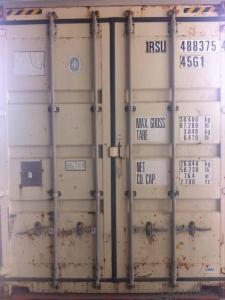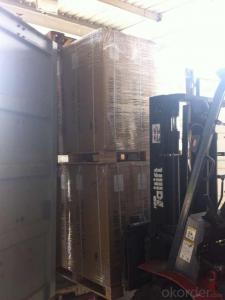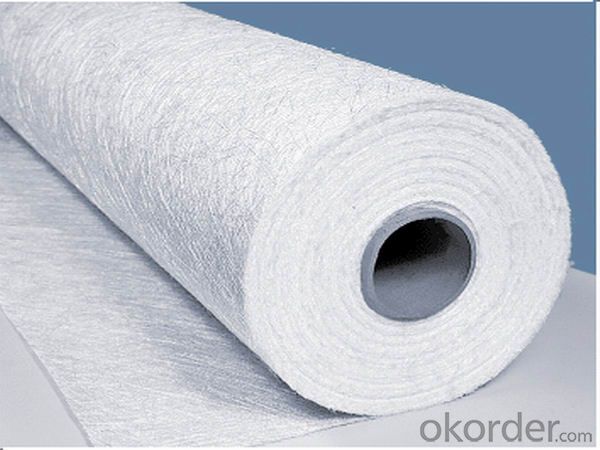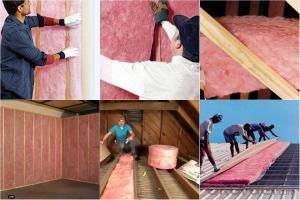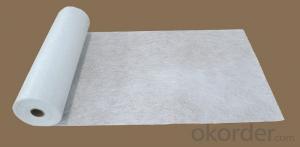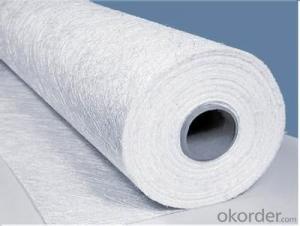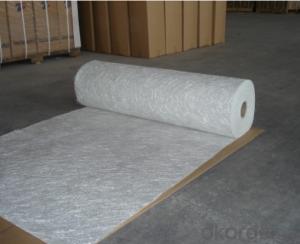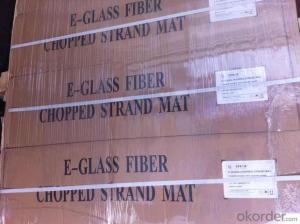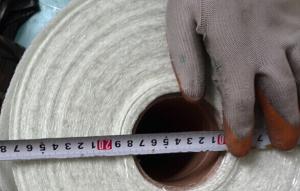Fiberglass Mat Tissue Chopped Strand Mat with Powder Binder
- Loading Port:
- Shanghai
- Payment Terms:
- TT OR LC
- Min Order Qty:
- 20000 kg
- Supply Capability:
- 200000 kg/month
OKorder Service Pledge
OKorder Financial Service
You Might Also Like
1.Brief Introductions
Fiberglass chopped strand mat with powder binder is made of randomly distributed chopped strands held together by a powder binder.
The roll width ranges from 50mm to 3300mm.
Additional demands on wet-out and decomposition time may be available upon request.
2.Product Features
Fast breakdown in styrene
High tensile strength, allowing for use in hand lay-up process to produce large-area parts
Good wet-through and fast wet-out in resins, rapid air lease
3.Product Specifications
Property | Area Weight | Moisture Content | Size Content | Breakage Strength | Width |
(%) | (%) | (%) | (N) | (mm) | |
Property | IS03374 | ISO3344 | ISO1887 | ISO3342 | |
EMC80P | ±7.5 | ≤0.20 | 8-12 | ≥40 | 50-3300 |
EMC100P | ≥40 | ||||
EMC120P | ≥50 | ||||
EMC150P | 4-8 | ≥50 | |||
EMC180P | ≥60 | ||||
EMC200P | ≥60 | ||||
EMC225P | ≥60 | ||||
EMC300P | 3-4 | ≥90 | |||
EMC450P | ≥120 | ||||
EMC600P | ≥150 | ||||
EMC900P | ≥200 |

4.FAQ
Packaging:
Each Chopped Strand Mat is wound onto a paper tube which has an inside diameter of 76mm and the mat roll has a diameter of 275mm. The mat roll is wrapped up with plastic film,and then packed in a cardboard box or wrapped up with kraft paper. The rolls can be vertically or horizontally placed. For transportation, the rolls can be loaded into a cantainer directly or on pallets.
Delivery Time:
10-20 days after getting the down payment or original acceptable L/C.
- Q: What is the maximum temperature fiberglass mat tissue can withstand?
- The maximum temperature that fiberglass mat tissue can withstand depends on various factors such as the specific type of fiberglass used, the thickness of the tissue, and the manufacturing process. Generally, fiberglass mat tissue can withstand temperatures up to 1000°F (538°C) without significant degradation or loss of mechanical properties. However, it is important to note that prolonged exposure to high temperatures can still cause some deterioration in the material's performance. For applications requiring higher temperature resistance, specialized fiberglass materials with enhanced heat resistance can be used. It is recommended to consult the manufacturer or supplier for specific temperature ratings and guidelines for the particular fiberglass mat tissue being used.
- Q: How does fiberglass mat tissue perform in terms of chemical resistance?
- Fiberglass mat tissue generally exhibits good chemical resistance due to the inherent properties of fiberglass, making it suitable for various applications where exposure to chemicals is a concern.
- Q: What is the expected lifespan of fiberglass mat tissue in underground applications?
- Different factors can affect the expected lifespan of fiberglass mat tissue in underground applications. These factors include the conditions of the underground environment, the quality and thickness of the fiberglass mat tissue, and the level of maintenance and care provided. On average, fiberglass mat tissue is known for its durability and longevity, which makes it suitable for use underground. Generally, fiberglass mat tissue is designed to resist corrosion, moisture, and other environmental elements commonly found in underground settings. This makes it a reliable choice for protecting underground pipes, tanks, and other infrastructure from deterioration. When installed correctly and maintained regularly, fiberglass mat tissue can last 50 years or more in underground applications. However, it is important to note that this estimate can vary depending on the specific conditions and usage of the fiberglass mat tissue. To maximize the lifespan of fiberglass mat tissue in underground applications, it is recommended to follow industry best practices. These practices include using proper installation techniques, conducting regular inspections, and promptly addressing any cracks or damage. By following these steps, the lifespan of fiberglass mat tissue can be extended, ensuring long-term reliability and durability underground.
- Q: How does fiberglass mat tissue compare to polyurethane insulation?
- In the construction industry, fiberglass mat tissue and polyurethane insulation are commonly used materials, but they differ in terms of their composition, performance, and applications. Fiberglass mat tissue consists of woven glass fibers and is primarily used to reinforce various materials, including roofing, wall insulation, and fiberglass composites. Its main advantage lies in its high tensile strength, which provides excellent structural support and durability. Additionally, it is resistant to fire and chemicals, making it a suitable option for applications where safety is a concern. In contrast, polyurethane insulation is a foam material known for its exceptional thermal insulation properties. It is frequently utilized in buildings to minimize heat transfer and enhance energy efficiency. With its high R-value, indicating its ability to resist heat flow, it is particularly well-suited for insulation purposes, especially in regions with extreme temperature conditions. Furthermore, polyurethane insulation is lightweight, easy to install, and exhibits good moisture resistance. When comparing fiberglass mat tissue to polyurethane insulation, it is crucial to consider the specific requirements of the project. Fiberglass mat tissue is best suited for applications that necessitate structural reinforcement, such as roofing and composite materials. Its strength and durability make it the preferred choice for such applications. On the other hand, polyurethane insulation excels in terms of thermal insulation. It offers superior heat resistance and possesses a higher R-value compared to fiberglass mat tissue. Therefore, if the primary objective is to enhance energy efficiency and minimize heat transfer, polyurethane insulation would be the superior option. In conclusion, fiberglass mat tissue and polyurethane insulation each have their own advantages and disadvantages. The decision regarding which material to use should be based on the specific needs of the project, whether it be structural support or thermal insulation requirements. Consulting with a professional and taking into account factors such as budget, environmental impact, and local building codes will aid in making an informed decision.
- Q: What is the delamination strength of fiberglass mat tissue?
- The delamination strength of fiberglass mat tissue refers to its ability to resist the separation or detachment of layers within the material. This strength is dependent on various factors such as the quality of the resin used, the thickness and density of the mat, and the manufacturing process. Fiberglass mat tissue is typically designed to have a high delamination strength to ensure its durability and structural integrity. The mat is composed of multiple layers of glass fibers held together by a binder or resin. The bonding between these layers is crucial in preventing delamination. The delamination strength of fiberglass mat tissue can be determined through various testing methods, such as the peel test, where the force required to separate the layers is measured. This test provides valuable information about the adhesive strength between the layers and helps in assessing the overall quality of the material. The delamination strength can vary depending on the specific application and requirements. For example, fiberglass mat tissue used in construction or automotive industries may have different delamination strength specifications compared to those used in marine or aerospace applications. Manufacturers typically provide technical data or specifications indicating the delamination strength of their fiberglass mat tissue products. It is important to note that the delamination strength of fiberglass mat tissue can be influenced by external factors such as exposure to extreme temperatures, moisture, or chemical substances. Therefore, proper installation, maintenance, and adherence to recommended usage guidelines are essential to maintaining the desired delamination strength and overall performance of the material.
- Q: How is fiberglass mat tissue used in the production of storage containers?
- Fiberglass mat tissue is commonly used in the production of storage containers to reinforce and strengthen the structure. It is typically applied as a layer between the layers of resin and fiberglass to improve the container's durability and resistance to cracking or breaking. The fiberglass mat tissue acts as a reinforcement material, providing additional strength and stability to the container, making it more suitable for heavy-duty storage purposes.
- Q: Can fiberglass mat tissue be used for repairing fiberglass surfboards?
- Yes, fiberglass mat tissue can be used for repairing fiberglass surfboards. It is a common material used in surfboard repairs as it provides added strength and stability to damaged areas.
- Q: Is fiberglass mat tissue resistant to acids?
- Yes, fiberglass mat tissue is generally resistant to acids. Fiberglass is known for its excellent corrosion resistance properties, and this includes resistance to various acids. The combination of fiberglass mat and resin creates a strong and durable material that can withstand exposure to a wide range of chemicals, including acids. However, it is important to note that the specific type and concentration of acid can still affect the resistance of fiberglass mat tissue. In some cases, certain highly concentrated or aggressive acids may cause damage or degradation to the material over time. Therefore, it is always advisable to consider the specific acid being used and consult the manufacturer's recommendations for compatibility before exposing fiberglass mat tissue to any acidic environment.
- Q: How is fiberglass mat tissue different from fiberglass cloth?
- Fiberglass mat tissue and fiberglass cloth differ primarily in their construction and application. Fiberglass mat tissue is a non-woven material made of randomly oriented glass fibers bonded together with a binder. It is typically thinner and lighter than fiberglass cloth. Mat tissue is commonly used as a reinforcement layer in composite materials, providing strength and stability. On the other hand, fiberglass cloth is a woven fabric made of individual glass fibers arranged in a grid-like pattern. It is generally thicker and heavier compared to mat tissue. Fiberglass cloth is commonly used for applications requiring high strength and stiffness, such as boat building, aerospace, and automotive industries. In summary, the key differences between fiberglass mat tissue and fiberglass cloth lie in their construction, weight, and intended application. Mat tissue is a non-woven, lighter material used for reinforcement, while cloth is a woven, heavier fabric suitable for applications requiring high strength.
- Q: Does fiberglass mat tissue provide any electrical insulation?
- Indeed, electrical insulation is provided by fiberglass mat tissue. Fiberglass, as a material, is non-conductive, signifying its incapability to conduct electricity. Once utilized as a mat tissue, it serves as a protective obstacle, effectively obstructing the passage of electrical current through the material. Consequently, it becomes fitting for a wide range of electrical applications necessitating insulation, including the production of circuit boards, electrical panels, and insulating tapes. Furthermore, fiberglass mat tissue is recognized for its exceptional dielectric strength, thereby augmenting its electrical insulation attributes.
Send your message to us
Fiberglass Mat Tissue Chopped Strand Mat with Powder Binder
- Loading Port:
- Shanghai
- Payment Terms:
- TT OR LC
- Min Order Qty:
- 20000 kg
- Supply Capability:
- 200000 kg/month
OKorder Service Pledge
OKorder Financial Service
Similar products
Hot products
Hot Searches
Related keywords

